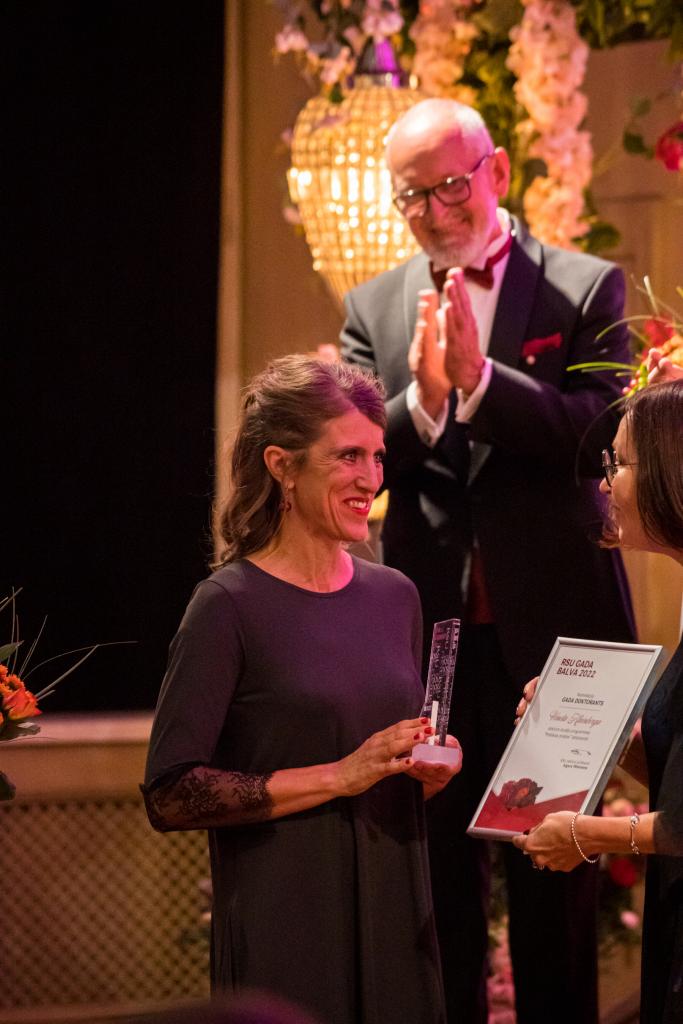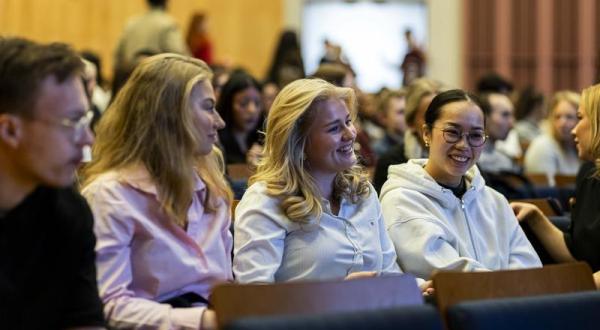Doctoral Student of the Year Vineta Kleinberga: ‘We see Russia as a bigger threat than climate change’
Vineta Kleinberga, a researcher at the Faculty of European Studies at Rīga Stradiņš University (RSU), is the first student from the social sciences to receive the University’s Doctoral Student of the Year Award. She received the award at the RSU Academic Ball this year (pictured).

How did it feel to receive the award?
I felt both very surprised and elated. It is recognition of my work and I thank everyone who nominated me for this award.
I also see it as a symbol of appreciation for the social sciences study programmes that have now been offered at RSU for almost 25 years.
I was among the first students admitted to the Faculty of European Studies and also among the first alumni of the programme. Before now, no social sciences doctoral student had received the award. So, this award is also dedicated to the social sciences.
Awards are presented for specific accomplishments. In your case, it is your extensive research on the perception of climate change in the political environment and society. Do we even think about climate change in Latvia at the moment?
My award is linked to the study that aims to explore the strategic narrative of climate change in Latvia. How do we communicate about climate change in Latvia, what do we believe? We are exploring this on the level of politics, business, media, and society and analyse commonalities and differences. According to the theory, the more coherent these different narratives are, the more effective and proactive the action can be.
We will come up with recommendations for policy makers on how to implement climate change communication in Latvia. This project is included in the fundamental and applied research programme funded by the Latvian Council of Science. It was launched in 2021 and will conclude in 2023. We are halfway there but have already been able to draw several conclusions.
What are they?
We have studied the narratives that are publicly available on various websites, in political party programmes, in politicians' speeches and other sources. We will go even further and organise in-depth interviews, focus groups, and a representative sociological survey.
In general, there are many narratives, they are fragmented, and localised, with relatively low involvement. Greater coherence can be seen in cases when there are common interests.
For example, industry associations and social partners consider that the government has acted rather unilaterally in supporting the European Green Deal, without involving the Latvian public and business representatives in the process.
The importance of the Green Deal and the opportunities for business are emphasised on a political level, but this is good as far as it goes. There is no dialogue with companies on how to implement this policy in a way that is beneficial for business and Latvia's competitiveness. We will explore the reasons for this gap between the political and business narratives later in the study.
Overall, climate change is not a hot topic in Latvian society or in the political environment.
We rarely discuss how climate change is affecting and will affect Latvia in the future – the environment, industries, and population. The European Green Deal and related activities are seen as topical, but they are not discussed in relation to mitigating climate change and its impact in Latvia, but rather as a policy that Latvia follows because it is a member of the European Union. This narrative however does not motivate people to contribute to the Green Deal personally. It does not single out a threat that could be felt and understood on a personal level.
Due to Russia's invasion of Ukraine, we are talking a lot about energy resources. How is this reflected in the study?
Russia's invasion of Ukraine has raised the profile of the European Green Deal in Latvia. This is determined by the energy risks arising from Russian aggression. In Latvia, we are talking about energy efficiency, the transition to renewable energy, electromobility, waste reduction, and other environmental issues. However, this narrative is not placed in the context of climate change.
For example, we are now talking a lot about energy efficiency, thinking about the cost of energy resources, energy independence and security, but we link this to Russian aggression rather than to the threat posed by climate change.
We can assume that climate change is not a motivating factor for any action taken at the moment. Both aspects are, however, interconnected. By taking care of our energy independence, we can also reduce the negative impacts of climate change, especially if we act wisely, for example by replacing imported fossil resources with domestic renewable resources instead of other fossil resources.
Why is the topic of climate change not relevant enough?
We are well aware that actions are often triggered by threats, and this is one of the keys to building a strategic narrative.
We see Russia as a threat, but not climate change. This affects policy.
The political parties' election manifestos confirm this, as almost every party has a section on energy security. It is not, however, placed in the context of climate change, which could serve as an incentive to look for the most climate-friendly energy security solutions.
I very much hope that the conclusions and recommendations that we will present to policy makers will be taken into account. I believe that decisions should be based on research results and not on individual opinions.
Related news
 Welcome to winter at RSU: international students begin their studies in RigaTraditional Events, For Students
Welcome to winter at RSU: international students begin their studies in RigaTraditional Events, For Students


